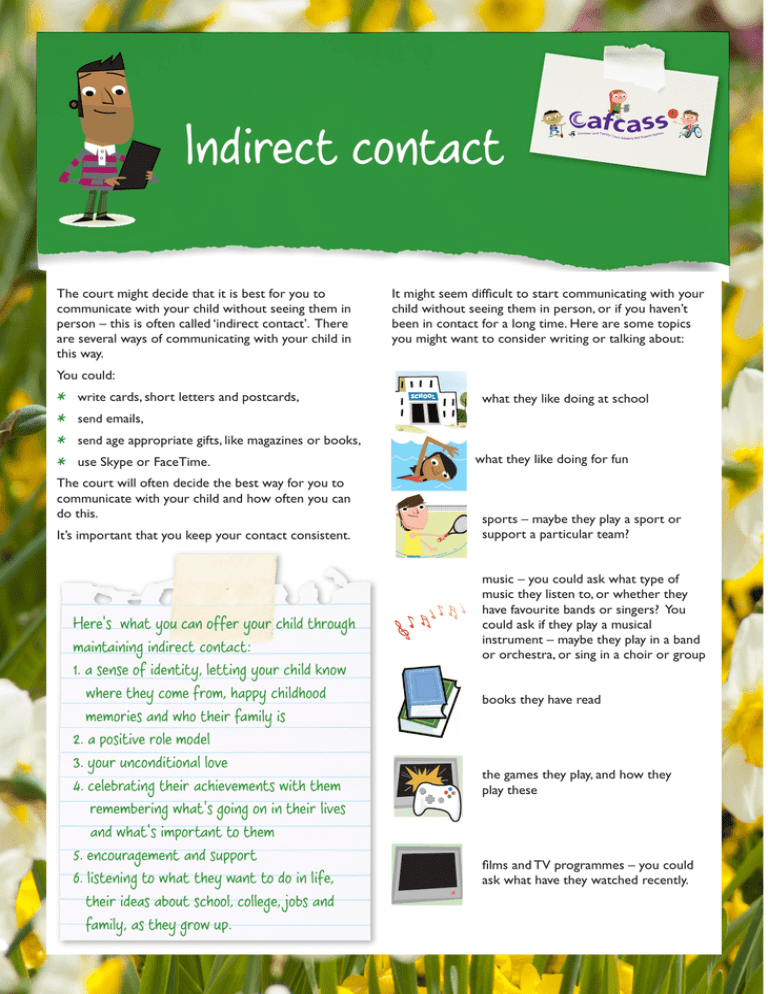Indirect contact
advertisement

Indirect contact The court might decide that it is best for you to communicate with your child without seeing them in person – this is often called ‘indirect contact’. There are several ways of communicating with your child in this way. You could: * * * * write cards, short letters and postcards, It might seem difficult to start communicating with your child without seeing them in person, or if you haven’t been in contact for a long time. Here are some topics you might want to consider writing or talking about: what they like doing at school send emails, send age appropriate gifts, like magazines or books, School use Skype or FaceTime. The court will often decide the best way for you to communicate with your child and how often you can do this. It’s important that you keep your contact consistent. Here’s what you can offer your child through maintaining indirect contact: 1. a sense of identity, letting your child know where they come from, happy childhood memories and who their family is 2. a positive role model 3. your unconditional love 4. celebrating their achievements with them remembering what’s going on in their lives and what’s important to them 5. encouragement and support 6. listening to what they want to do in life, their ideas about school, college, jobs and family, as they grow up. what they like doing for fun sports – maybe they play a sport or support a particular team? music – you could ask what type of music they listen to, or whether they have favourite bands or singers? You could ask if they play a musical instrument – maybe they play in a band or orchestra, or sing in a choir or group books they have read the games they play, and how they play these films and TV programmes – you could ask what have they watched recently. Tips for writing Gifts When you are writing to your child, keep their age in mind. It’s a good idea to keep your writing short and not to ask too many questions at once as it can come across as intrusive. A useful method is to ask a question and then follow it up with information about yourself that relates to your question. For example, “How is school?” or “What is your favourite subject?” could be followed up by, “When I was at school, I really enjoyed history.” You might want to tell them what you have been doing. You could send some photographs so your child can see what their family looks like, if the court has said this is OK. The court will let you know if it’s OK to send small presents. You might want to send a book, comic or CD depending on your child’s interests. If you are sending to more than one child then make sure that gifts are of an equal value or significance. Remember it is the thought that counts, rather than the expense of the gift. Have you been to see something that you think your child might enjoy? You could tell them about this. Do not be afraid to share your everyday life – it may seem boring to you but it can be of interest to your child. You could also write about some happy memories you have had from a positive family experience. If you are writing about your family members then make sure you do this in a non-threatening manner and without any hidden meaning. For example, writing “Nana really misses you and really wants to see you”, may make a child sad and feel that they have done something wrong. You could say something like: “I spoke to Nana last week and she says hi”, which shows your child that your family is thinking about them. Let your child know that you are OK so that they don’t worry about you. If you don’t feel comfortable writing, you could draw a picture. You could use felt tip pens and stickers, in line with your child’s age. It might be nice to send them puzzles or pictures to colour in. Don’t worry about grammar – it’s more important your child knows you are thinking of them. It is fine to end the letter “Love Mum” or “Love Dad”, or let your child know that you miss them – but don’t mention this too much. You need to give your child time and space to get used to this sort of communication from you. © Cafcass. Published Cafcass, 21 Bloomsbury Street, London, WC1B 3HF www.cafcass.gov.uk Responses If your child does respond then you might want to try watching a few movies or listening to some of their bands (even though you might not exactly enjoy the process) so you’ll have more to talk about next time you write. Don’t worry if your child takes a while to respond; it’s important that they can take the time to do so. If you do not receive a response from your child and want to discuss this with someone, you may want to visit the Family Lives website www.familylives.org.uk or the Coram Children’s Legal Centre for information on child law www.childrenslegalcentre.com. If your child lives with you As resident parent it is important you are supportive of indirect contact taking place. Encourage your child to read letters and respond to them. If your child is Skyping or FaceTiming the other parent, make sure the sessions start on time and the room is quiet so that they can hear one another.


